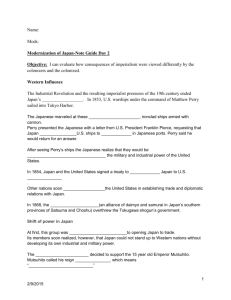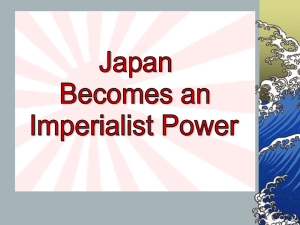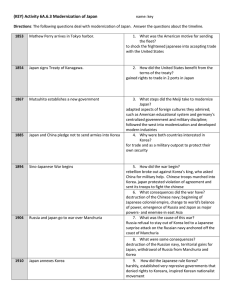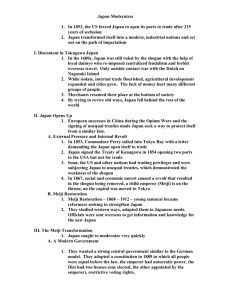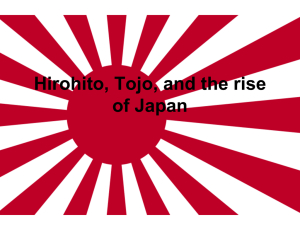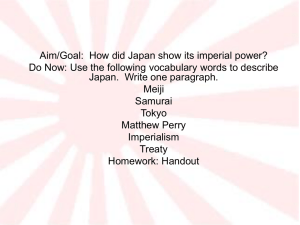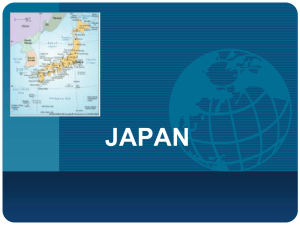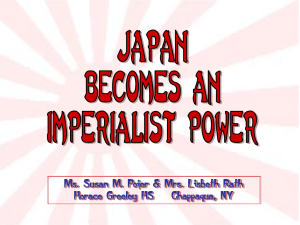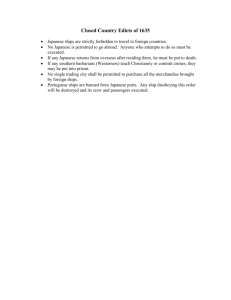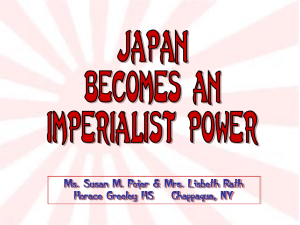File
advertisement
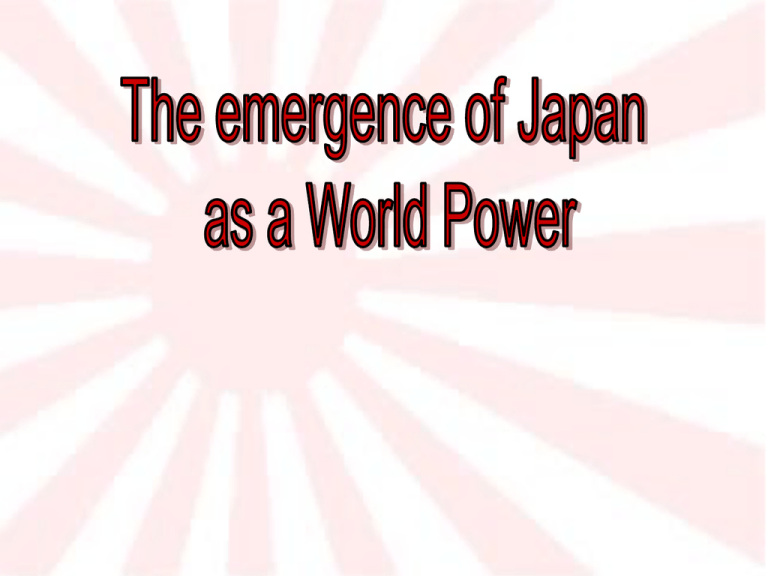
• Page 27 #1-3 • How Far had Japan achieved world power status by 1914? • One list containing evidence that it had • One list it had not • Page 24-27 Japan before 1871 1853 – Commodore Matthew Perry “Opens Up” Japan to Western Trade! Tokugawa Isolation • Prior to the arrival of Matthew Perry of the U.S. in 1854 Japan had been isolated for 200 years. • In 1500’s Europeans had tried to trade with Japan however the Shoguns had gained control of Japan and banned contact with almost the entire outside world. What Did the U. S. Want?? . . . Perry’s “Black Ships” Commodore Matthew Perry • In 1854 Perry gave Japan a letter asking them to open trade with the U.S. • Americans and Europeans wanted both to open trade with Japan and also use Japanese ports to repair and resupply their ships. The Treaty of Kanagawa - 1854 Treaty of Kanagawa • The Treaty had a powerful impact on Japan. • It weakened the power of the shogun who some Japanese felt had given in to foreigners. • It showed that for for Japan to compete with the west that Japan had to modernize and industrialize. • The Japanese rebelled against and overthrew the Shogun, restored the emperor, and began to modernize and industrialize. Japan Learns a Lesson! In 1862, just before the start of the Meiji period, Tokugawa sent officials and scholars to China to study the situation there. A Japanese recorded in his diary from Shanghai… China’s “Unequal Treaties” After the Opium War of 1839-1842, Japan was convinced that it had to Open Up to the West. European merchants had already seized large parts of China and had imposed their own laws there. To avoid the same fate, the people of Japan demanded for the restoration of the emperor instead of the shogun as the leader of Japan. By 1869 Emperor Mutsohito and his Meiji government set about modernizing and uniting Japan under one government in order to resist imperial powers. Rapid modernization and military development The Japanese modeled their education system, form of government, and military after the West. Mines, iron foundries, factories and shipyards quickly developed. Some of these became private enterprises (Mitsubishi shipyards). The Emperor Is “Restored” to Power MEIJI “Enlightened Rule” Newspaper Cartoon, 1870s? Enlightened Half-Enlightened Un-Enlightened Modernization by “Selective Borrowing” Start by leaving Japan & studying in various Western capitals. End by returning to Japan and becoming a prominent government official. European Goods Europe began to “loom large” in the thinking of many Japanese. New slogan: The Japanese Became Obsessed with Western Styles Civilization and Enlightenment! Everything Western Was Fashionable! Everything Western Was Fashionable! Japanese soldiers with their wives. The Rulers Set the Tone with Western Dress Emperor Meiji Empress Haruko (1868- 1912) Changing Women’s Fashions 1900 Styles The First “Miss Japan” (1908) 2. 1. 9. 3. Meiji Reforms 8. 4. 5. 7. 6. • 1/3 of the national budget was spent on the army and navy and military service was compulsory for all adult males. Children were taught to be patriotic and the Shinto religion was revived (belief that the emperor descended from a god). Japan became an imperial power in its own right. • The Chinese empire was shrinking which provided the opportunity for Japan to test its military strength. The Japanese army overran Korea, Manchuria and parts of China. Sino-Japanese War: 1894-1895 The Meiji Emperor was in Hiroshima during the Sino-Japanese War Japan as a Global Power • Sino-Japanese War • 1894-1895 • Japan tries to expand into Korea. • China goes to war with Japan over Korea. • Japan quickly wins the war • Japan gets Taiwan, ports in China, and Korea becomes a protectorate of Japan. Soldiers on the Battlefield During the Sino-Japanese War The Treaty of Shimonoseki ended the war. Japan gained Formosa and Port Arthur. Korea was declared free of Chinese Japan was not the only one with an interest in China. France, Russia, and Germany had interests there as well. Russia wanted Port Arthur as an “ice-free” port to expand its influence in Asia. All three European nations forced Japan to give it up to Russia. Japan decided to build up its navy and wait for an opportunity for revenge. The Russo-Japanese War: 1904-1905 The Battle of Tsushima: The results startled the world! • Russia occupied all of Manchuria which was a threat to British interests in East Asia. They both signed the Anglo-Japanese Alliance which was an agreement to remain neutral if either country was involved in war. • Japan was ready to recognize Russian rights in Manchuria for rights in Korea. The Russians refused to negotiate and then invaded Korea. Japan attacked an unprepared Russian fleet. • The Japanese took control of the seas and once Port Arthur was taken the Japanese moved into Manchuria forcing the Russian troops to retreat. • While the Russians were sailing through the North Sea, they mistakenly fired upon British fishing ships. Through diplomatic negotiations, the two countries avoided war, but Britain refused the Russians to use the Suez Canal forcing them to travel around Africa to get to Japan. • The Russian and Japanese ships finally faced each other, but the slow-moving and outdated Russian ships could not compete with the modern Japanese ships. • Facing humiliation and a revolution in Russia, Czar Nicholas II signed the Treaty of Portsmouth with Japan. Russian influence ended in Manchuria and Japan’s rights in Korea were officially recognized. President Teddy Roosevelt Mediates the Peace The Treaty of Portsmouth, NH ended the Russo-Japanese War. Japan as a Global Power • Russo-Japanese War • • • • • • 1904-1905 Both Japan and Russia have interest in Korea. Russia refuses to recognize Japan’s rights to Korea. Japan launches a surprise attack against the Russians destroying the Russian navy and driving the Russian troops out of Korea. Russia is forced to withdraw from Korea Japan is seen as a major military power with the defeat of a European nation Japan Annexes Korea Japan Is a Player in China • Japan had developed into a modern, industrial country with the military capacity to defeat a major European power. But, Japanese Power Would Grow . . . Japan as a Global Power • Results of Imperialistic Japan • Japan borrowed many western ideas to become a modern and industrialized nation. • Japan quickly establishes itself as a strong military power. • Japan needs to continue to colonize to keep raw materials coming in and finished products going out of the country. Japan’s Industrial Revolution v Europe’s Industrial Rev • Japan • Japan’s Ind. Rev only took about 30 years because they borrowed everything • Private corporationsWealthy class • Urbanization • Need for raw materials • Europe • Europe’s industrial Rev. a century because they had to invent everything • Private CorporationsWealthy class • Urbanization • Need for raw materials
